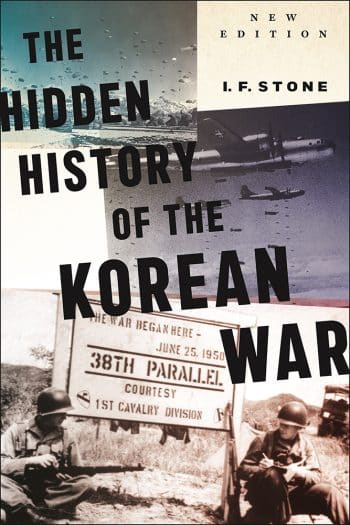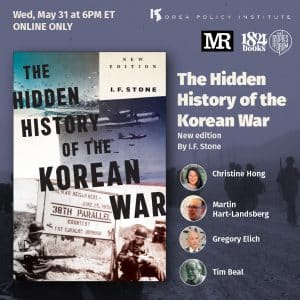All most people know about the Korean War is that it was dubbed the “forgotten war.” They may not fully understand that it occurred at the height of anti-Communist blacklists, the purges of so-called “red” journalists and movie stars and so on — and that all this resulted in a media blackout. The tangled sequence of events leading to the Korean War were obfuscated in plain sight in order to prep the ground for a never-ending Cold War which aims to secure enduring American hegemony in East Asia, above all else. In spite of every effort to conceal the details of the Korean war as it was happening, the well-beloved journalist I.F. Stone copiously documented it in full, producing an important document from the time with lasting significance for all of us today.

At first no one would touch Stone’s findings – they were too hot. But Stone got in touch with Monthly Review – and in the end this was the first book we published.
Courageously written at the height of the McCarthy era, officials never refuted nor denied the book’s claims, but Stone’s book still got a real audience due to the durable reputation of the journalist himself.
ABOUT THE SPEAKERS
Christine Hong chairs the department of Critical Race and Ethnic Studies and directs the Center for Racial Justice at UC Santa Cruz. She is the author of A Violent Peace: Race, Militarism, and Cultures of Democratization in Cold War Asia and the Pacific (Stanford UP, 2020). She co-directed the Legacies of the Korean War oral history project and now serves on the board of directors of the Korea Policy Institute.
Martin Hart-Landsberg is professor emeritus of economics at Lewis and Clark College. He is the author of seven books on issues related to globalization and the political economy of East Asia, including Korea: Division, Reunification, and U.S. Foreign Policy and The Rush to Development: Economic Change and Political Struggle in South Korea, both published by Monthly Review Press. He is a member of the Board of Directors of the Korea Policy Institute and has served as consultant for the Korea program of the American Friends Service Committee.
Gregory Elich is a Korea Policy Institute board member. He is a contributor to the collection Sanctions as War: Anti-Imperialist Perspectives on American Geo-Economic Strategy (Haymarket Books).
Tim Beal is a retired New Zealand academic with a special interest in U.S. imperialism, particularly with respect to Asia. He first read, and wrote about, Izzy Stone’s book The Hidden History of the Korean War as an undergraduate at Edinburgh University in 1970 — initiating a journey of discovery that has resulted in two books and numerous articles on Korea and imperialism. (You can see a recent piece he wrote about the talk, published by the Australian publication Pearls and Irritations.)

Comments are closed.